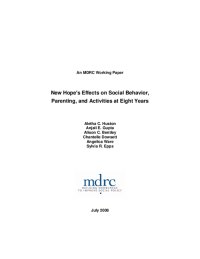New Hope’s Effects on Social Behavior, Parenting, and Activities at Eight Years
Conceived of in the late 1980s and implemented in 1994 in two inner-city areas in Milwaukee, Wisconsin, New Hope was an innovative program designed to address problems in the low-wage labor market. New Hope provided full-time workers with several benefits: an earnings supplement to raise their income above poverty, low-cost health insurance, and subsidized child care. For those unable to find full-time work, the program offered help in finding a job and referral to a wage-paying community service job when necessary. During the demonstration project, each of these benefits was available for up to three years.
This working paper examines children’s social behavior, parent-child relationships, and participation in out-of-school activities at the eight-year follow up of the New Hope Project (five years after the program ended) by comparing program-group and control-group children. The findings show that New Hope continued to increase children’s positive social behavior, as reported by their parents, through year eight, and continued to increase the amount of time children spend in structured out-of-school activities.






